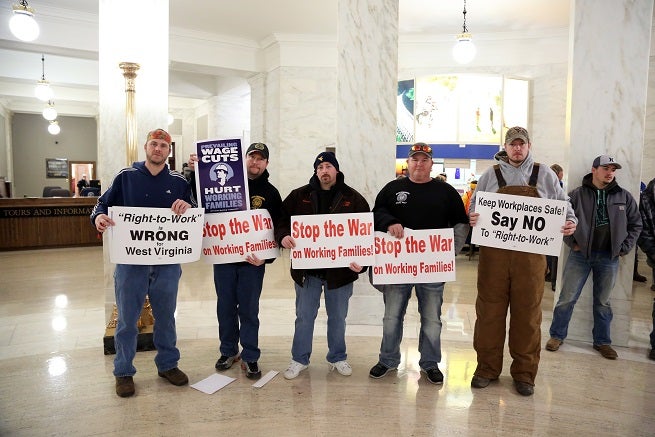Uncategorized
W.Va. House Takes Step to Hurt Workers

(Paul Nyden, a long-time West Virginia labor reporter, will occasionally be contributing to the Teamster Nation blog about issues before the state’s Legislature. His latest report follows.)
The West Virginia House of Delegates passed legislation yesterday afternoon to repeal the state’s 81-year-old Prevailing Wage Act, which protects the jobs and wages of construction workers.
The vote came after the state Senate narrowly passed right-to-work (RTW) legislation last week. That bill would permit workers in union shops to opt out of union membership and paying union dues – even though the union bargains for them.
Each piece of legislation now goes to the opposite chamber for its consideration.
The Republican Party, which won majorities in both houses in the 2016 elections for the first time in decades, made these two issues top priorities for legislation this session.
House Minority Leader Tim Miley (D) proposed on Tuesday that a study be conducted to predict the impact of the prevailing wage bill before it is passed and is implemented.
“There could be no savings to taxpayers,” Miley said. “And we will see an influx of out-of-state construction workers and employees.”
Miley’s proposal to conduct a study over the five years to examine the impacts of the legislation, before implementing it. But the amendment was defeated yesterday.
Many private construction contractors — hired by the state to build roads, bridges, schools and other projects – also oppose these two pieces of legislation.
Steve White, executive director of the Affiliated Construction Trades Foundation, based in Charleston, said, “We have a lot of contractors who oppose right-to-work. They don’t understand why government has to tell them how to do business. They partner with our workers.”
Kenny Perdue, president of the West Virginia AFL-CIO, said, “The Prevailing Wage law has been a proven economic winner. It puts money into communities, helps send kids to college and helps people buy cars. It would be sad and disappointing to lower wages in this great state.”
Perdue said prevailing wages vary throughout the state, reflecting local economies.
“Prevailing wages create an environment that gives local contractors a chance to bid on contracts and not get outbid by out-of-state contractors who pay low wages and often hire illegal workers. They create a fair market for bidding.
“And low bidders often do poor-quality construction,” Perdue added.
Delegate Isaac Sponaugle (D) said on the House floor on Wednesday that repealing prevailing wages would cut between $56 million and $84 million a year from workers’ wages and state tax collections.
Predicting the vote to abolish prevailing wages will pass, Rep. Nancy Guthrie (D) said, “Unions made this country’s middle class…. This is one of the saddest days I have ever spent in this chamber.”